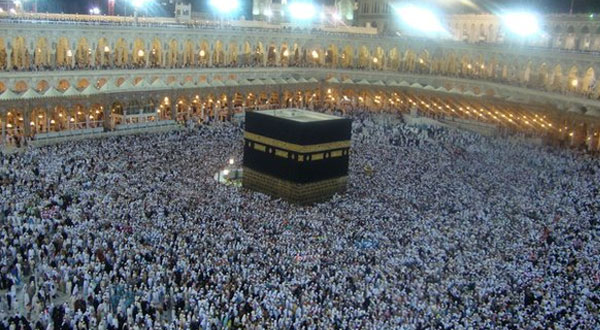BEIJING: The Chinese government in its policy of facilitating the people to carry out their religious rites has provided special facilities to Chinese Muslims to perform Haj.
Over 14,000 Chinese Muslims have so far been sent to Mecca for the Hajj pilgrimage. The State Administration for Religious Affairs (SARA) said that 37 flights were chartered to take the Chinese Muslims to the annual Islamic pilgrimage in Saudi Arabia.
SARA vice head Zhang Yantong and other officials, including Saudi Arabia’s deputy ambassador to China, saw the pilgrims off at the Beijing Capital International Airport, the China News Agency (CNA) reported on Saturday.
Zhang said the Communist Party of China has always paid great attention to the Hajj and wished the pilgrims well, and hopes Chinese Muslims give a positive image, according to CNA.
A total of 297 Muslims boarded a chartered flight in Lanzhou, Gansu’s capital on August 15, according to the Gansu Entry-Exit Inspection and Quarantine Bureau.
It was reportedly Gansu’s first chartered flight this year to the Hajj.
Yang Zhibo, vice president of the China Islamic Association, told CNA on Saturday that over 10,000 Chinese Muslims have been going to Mecca each year since 2012,
The sources said, that the Chinese leadership fully respects freedom rights of the peoples. The prevailing Chinese laws protect normal religious activities, including attending religious services, fasting, preaching, and celebrating religious festivals.
These activities are protected by law, and no organization or individual may interfere with them. To ensure successful pilgrimages for believers in Islam, the largest Muslims’ populated region Xinjiang adopts a policy of organized and planned pilgrimages.
Since 1996 the Xinjiang government has arranged charter flights every year to take believers in Islam to Mecca in Saudi Arabia. The Xinjiang government funds medical care and interpretation for pilgrims, and offers other services to ensure safe and orderly pilgrimages.
The customs of religious believers are fully respected. State laws protect religious customs, including production, processing, storage, distribution and selling of halal food, supply of special food, setting up of halal restaurants and halal canteens.
During the Spring Festival, Eid al-Adha (Corban Festival), Eid al-Fitr and other major traditional festivals, all ethnic groups can enjoy statutory holidays and be supplied with special foodstuffs. Special cemetery areas are allocated for some ethnic-minority groups who traditionally bury their dead in the ground. Traditional practices of a religious nature, such as naming a child, funeral pray, burial, and holding Nazer (memorial activities), are respected.
Xinjiang now has 24,800 venues for religious activities, including mosques and churches. Among these, 24,400 mosques have 29,000 clerical personnel. There are eight religious colleges, including the Xinjiang Islamic Institute and Xinjiang Islamic School. There are also 112 religious organizations, among which, at the autonomous region level, there is one major organizations, namely, an Islamic association with a committee for Islamic affairs.
Channels for believers to gain religious knowledge have been expanded. Religious classics and books have been translated and published, including the Koran and Selections from Al-Sahih Muhammad Ibn-Ismail al-Bukhari, in the Uygur, Han Chinese, Kazak and Kirgiz languages. The New Collection of Waez’s Speeches series and the magazine China’s Muslims are compiled and published, with a total circulation of over 1.76 million.
From 2014 to 2015, Xinjiang has distributed 43 Islamic publications in different languages of minority ethnic groups, totaling over one million copies, including over 230,000 copies of new Koran and over 29,000 copies of Basic Knowledge of Islam, both in the Uygur language.
The China Islamic Association provides a Uygur-language version of its website. The Xinjiang Islamic Association publishes the magazine Xinjiang Muslims in the Uygur, Han Chinese and Kazak languages, providing free copies to mosques and clerical personnel. It has also opened the “Xinjiang Muslims” website in the Uygur and Han Chinese languages. Religious organizations hold training classes on religious knowledge and etiquette for believers.
Today, the freedom of religious belief in Xinjiang cannot be matched by that in any other historical period, and is undeniable to anyone who respects the facts. The Chinese government resolutely opposes the politicization of religious matters and any other country’s interference in China’s internal affairs in the name of religion.





